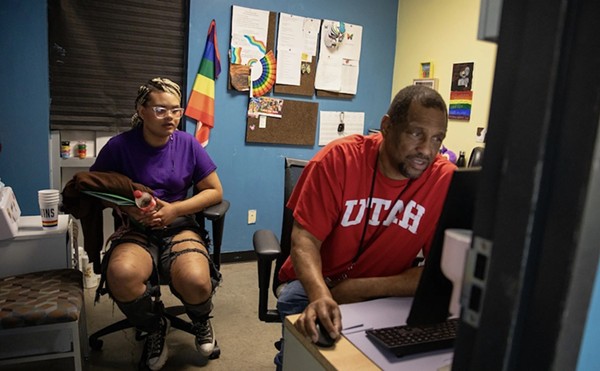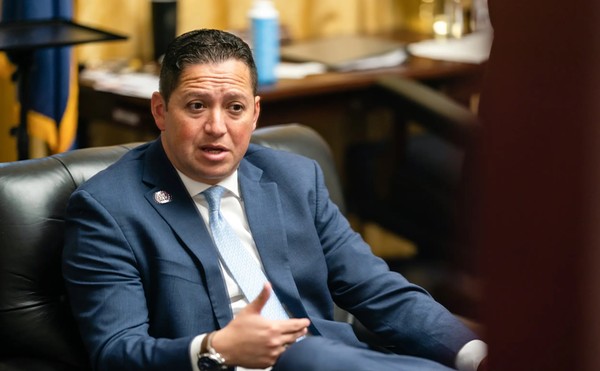The Religious Right in Texas counts among its biggest recent success stories two pieces of legislation affecting (mostly) public-school children across the state. One, enacted in 2003, mandates a “moment of silence” and the recitation of the pledges to the U.S. and Texas flags during each school day. The Right’s second victory altered the Texas pledge to include the words “state under God,” and was enacted by the 80th Legislature this spring.
Texas being the bright-and-shiny buckle of the Bible Belt it is, neither law has received much flack from the public outside of those who testified against the laws before legislative committees, and special-interest groups who have decried them following their implementation. But litigation in a Dallas federal court could derail both.
David Wallace Croft and his wife, Shannon, have sued Texas Governor Rick Perry, the state, and the Carrollton-Farmers Branch Independent School District in two separate instances: one suit challenging the moment of silence, and one suit challenging the new Texas pledge language.
The Croft’s moment-of-silence lawsuit was filed in 2003, but only came to trial in the past month. The pledge suit was filed shortly after the new school year began and the revised pledge began issuing bidden from students’ lips. It has yet to come to trial, although a federal judge recently denied the Crofts a restraining order that would have stopped recitation of the pledge in their childrens’ school.
Documents that have come to light as a result of the moment-of-silence suit raise disturbing questions about the law’s true purpose, and whether or not the Texas Education Agency helped legislators play a game of “cover your ass.” According to the statute’s language, which was passed as Senate Bill 83 by the 78th Texas Legislature and is codified in Section 25.082 of the Texas Education Code, the moment of silence has the purpose of allowing students to “reflect, pray, meditate, or engage in any other silent activity that is not likely to interfere with or distract another student.”
Though the mere mention of the word “pray” in the text of the law might, on its face, not be enough to declare the statute unconstitutional, Dean Cook, the Dallas attorney representing the Crofts, notes that legislative intent plays a major role in whether or not the statute is constitutional under the Establishment Clause of the First Amendment.
“When you look at the law itself, you must look at the legislative intent to determine whether or not the intent was secular or religious. We produced ample legislative history, including comments from various senators and representatives about how they wanted kids to pray in school,” Cook says.
Cook is indeed correct: Legislators were quite vocal about SB 83 being a vehicle to put prayer back in schools. Press releases archived on the websites of the Texas House and Senate show numerous comments from legislators that seem to illustrate that the lawmakers’ goal was far from secular.
“Other states have successfully implemented school prayer, and it is about time that Texas step up,” noted Representative Chuck Hopson, a Jacksonville Democrat, in a press release issued on May 8, 2003.
State Senator Jeff Wentworth, the San Antonio Republican who authored SB 83, hinted at its true purpose more than a full year before the 78th Legislature convened. In an October 31, 2001, press release announcing his intent to file the bill, Wentworth promised to “research these states’ statutes and other relevant laws to ensure that the bill’s language will pass any court challenge. The language also must reflect our pluralistic society with its many religions, which is why I favor silent prayer or meditation, rather than religion-specific prayers spoken out loud.”
With such strong evidence pointing to the religious nature of the law, it seems natural that when a legal challenge emerged, the state would try to cover itself. The person providing that cover was former Texas Education Commissioner Shirley Neeley. Neeley drafted a memorandum on October 10 of last year in which she reminded school administrators that the moment of silence was, among other things, designed to “enhance concentration” and “decrease student stress.” Her memo notes, in part:
“The moment of silence statute was passed to encourage thoughtful contemplation at the start of the school day, to promote patriotism through the students’ quiet reflection following the pledges of allegiance, and to protect individual religious freedom. Each of these separate purposes independently undergirds the statute.”
Neeley’s instructions were issued after Cook filed a motion for summary judgment.
“It’s a little fishy that memo came out when it did,” Cook says. “The Texas Education Agency is not the legislature, so what their view of what the law is is not what matters. It is whether or not the legislature believed the law to have a secular purpose.”
It would seem that U.S. District Judge Barbara Lynn, who heard the case, agrees.
“The timing of this letter providing a secular purpose is troubling to me,” Lynn said during August 7 proceedings.
Cook believes that the law is patently unconstitutional, but he admits that it’s not an open and shut case.
“Part of the problem is that there is not a single test to determine if it is constitutional or not,” Cook says. “There is the Lemon Test, which is a three-part test, and the ‘Endorsement Test,’ which was used by Justice `Sandra Day` O’Connor.
The Lemon Test dates to the days of the Warren Burger Supreme Court and provides that a statute “must have a secular legislative purpose,” “its principal or primary effect must be one that neither advances nor inhibits religion,” and that the law “must not foster ‘an excessive government entanglement with religion.’”
Croft also believes his clients stand a good chance of successfully challenging the new Texas pledge wording.
“Basically, we are arguing that the language added `by the Legislature` is a violation of the Establishment Clause. It’s not clear, if it got to that point, exactly how the U.S. Supreme Court would come down on the issue, but I believe we have a good chance because the language was inserted so recently,” Cook says. “Recently, courts have hinted that recent or longstanding traditions or references to God may be OK. Since this one is so recent, we think the court may be opposed to this.”
Texas Solicitor General Ted Cruz, who would argue the case before the Supreme Court if it goes that far, should be familiar with the “hint” Cook mentions. It was this “old versus new” standard that the Supreme Court invoked to allow Texas to keep its Ten Commandments monument on the grounds of the state capitol in Austin while striking down a more recent installment of the Ten Commandments in Kentucky.
“This is also different because the Supreme Court tends to realize that, in public-school children, you have a different, captive audience which is young and impressionable,” says Cook. “You don’t have that distinction with adults, who are the primary audience for a monument on the capitol grounds.”
Legislative intent will play a major role in the battle over the pledge as well. While legislators such as Debbie Riddle, the Tomball Republican who authored the bill, tried to sidestep the issue of religion when confronted by Houston Democrat Scott Hochberg on the House Floor late one night during the most recent legislative session, her words will no doubt face much closer scrutiny in the months to come. `See sidebar, this page` The Texas Education Agency deftly dodged the issue altogether, simply issuing a memorandum to school administrators advising them of the language change without explanation.
Although the lawsuits are receiving some media attention, it’s nothing on par with a situation several years ago when the 9th Circuit Court of Appeals ruled recitation of the national pledge was unconstitutional in public schools because it included the words “under God.” Still, Cook emphasizes it is important litigation.
“There are a lot of people who will say these are minor things, or they are not that big of a deal — even people who agree with my clients will say that. The point is, however, that it’s like the old saying: ‘If you let the camel’s nose in the tent, eventually you let the whole camel in,’” he argues.
“That’s the principle here. These may be minor, but if this continues, there will be more and more of these violations of the Establishment Clause. It’s important to fight them now, while they are still relatively minor.” •


















